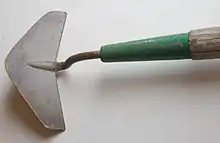Weeder
A number of common weeding tools are designed to ease the task of removing weeds from gardens and lawns.
- The fulcrum head weeder has a split tip like a serpent's tongue, and a long thin handle. Many models have a curved piece of metal along the handle which is put against the ground while the tip is digging. The curved metal piece acts as a fulcrum in a lever system. It is helpful to remove weeds either with a tap root or a fibrous root system.
- The Cape Cod weeder has a thin, long handle and a triangular scraping head. When the handle is held parallel to the ground, the head points downward.
- The crack weeder is a relative of the Cape Cod Weeder. It is designed to scrape out weeds growing in crevices, stone walls and other deep and narrow places. The plane of the L-shaped scraping blade includes the handle; the bottom of the "L" is parallel to it.
- Guna is a short traditional knife with a wide flat tip used for digging and weeding in the Philippines.[1]
- Homi is a short-handled traditional weeding and ploughing tool used by Korean People.[2][3][4]

The head of a weeder.
See also
References
- Conklin, Alfred R.; Stilwell, Thomas (2007). World Food: Production and Use. p. 11. ISBN 9780470168714.
- Kalins, Dorothy (13 October 1997). "Dorothy Kalins: Heirloom-variety: Garden Design's editor has created a refuge that's anything but bush-league". New York. 30 (39). p. 79. Retrieved 19 December 2017.
- Lembke, Janet (2006). From Grass to Gardens: How to Reap Bounty from a Small Yard. Guilford, CT: Lyons Press. p. 35. ISBN 1592287468. Retrieved 19 December 2017.
- Kim, Ji-myung (25 November 2011). "An unknown hallyu ― 'homi'". The Korea Times. Retrieved 19 December 2017.
Bibliography
- William Bryant Logan, Smith & Hawken The Tool Book, 1997
This article is issued from Wikipedia. The text is licensed under Creative Commons - Attribution - Sharealike. Additional terms may apply for the media files.